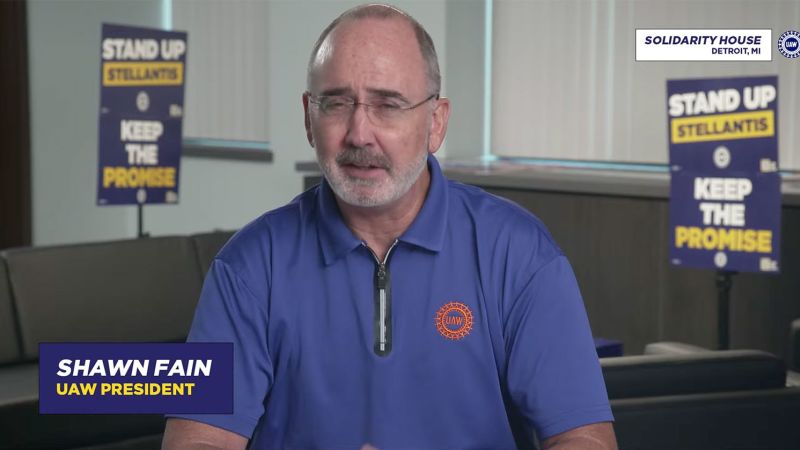The United Auto Workers union President Shawn Fain announced plans to hold strike authorization votes against Stellantis due to the automaker failing to meet guarantees made in the 2023 labor deal reached after a six-week strike. Fain stated that the union is prepared to strike if the company does not meet their demands, holding votes at one or more locals representing Stellantis workers, and enforcing the contract to save American jobs. Strike votes are common during contract negotiations, but this strike, if it occurs, would be unprecedented as the union won the right to strike during the contract in case of plant closings or job protection violations.
Stellantis, known for producing vehicles under brands like Jeep, Ram, Dodge, and Chrysler, had 43,000 UAW members at 19 manufacturing facilities nationwide during last year’s strike. Only some locals may hold strike authorization votes, potentially affecting only certain plants, but any strike could impact operations at other Stellantis facilities. The company did not immediately respond to Fain’s statements, and in response to an unfair labor practice charge by the UAW, Stellantis stated that it had not violated commitments made in the 2023 UAW collective bargaining agreement. The company emphasized managing vehicle launches to enhance competitiveness and future sustainability, with plans to inform the UAW at the appropriate time.
Fain criticized Stellantis CEO Carlos Tavares as the problem, refuting the company’s explanation and asserting that the union and the market are not the issues. The situation is ongoing, and updates will be provided as it unfolds. The union’s stance reflects a stance of asserting workers’ rights and protections outlined in the labor agreement, including the ability to strike if necessary to ensure compliance from the company. Stellantis’ response to the union’s accusations indicates a focus on managing operations for long-term growth and competitiveness, with a commitment to communicate plans with the UAW at the appropriate juncture.
The potential strike at Stellantis represents a significant development in labor relations within the automotive industry, as unions push for the protection of worker rights and job security amidst changing market conditions and company strategies. The decision to authorize strikes demonstrates the union’s determination to enforce the terms of the labor agreement and hold Stellantis accountable for any perceived violations. The outcome of this situation will likely impact the relationship between the union and the company, setting the tone for future negotiations and agreements. Both parties must navigate through these challenges to reach a resolution that aligns with the interests of workers and the company’s operational needs.
As the situation unfolds, there may be further dialogue and negotiations between the union and Stellantis to address the concerns raised and find a mutually acceptable resolution. The potential impact of a strike on production and operations underscores the significance of reaching a resolution that satisfies both parties while considering the broader implications for workers, the company, and the industry as a whole. The outcome of this conflict will shed light on the dynamics of labor relations in the automotive sector and shape future interactions between the union and Stellantis. It remains to be seen how this situation will evolve and what implications it will have for labor practices and agreements within the industry.


